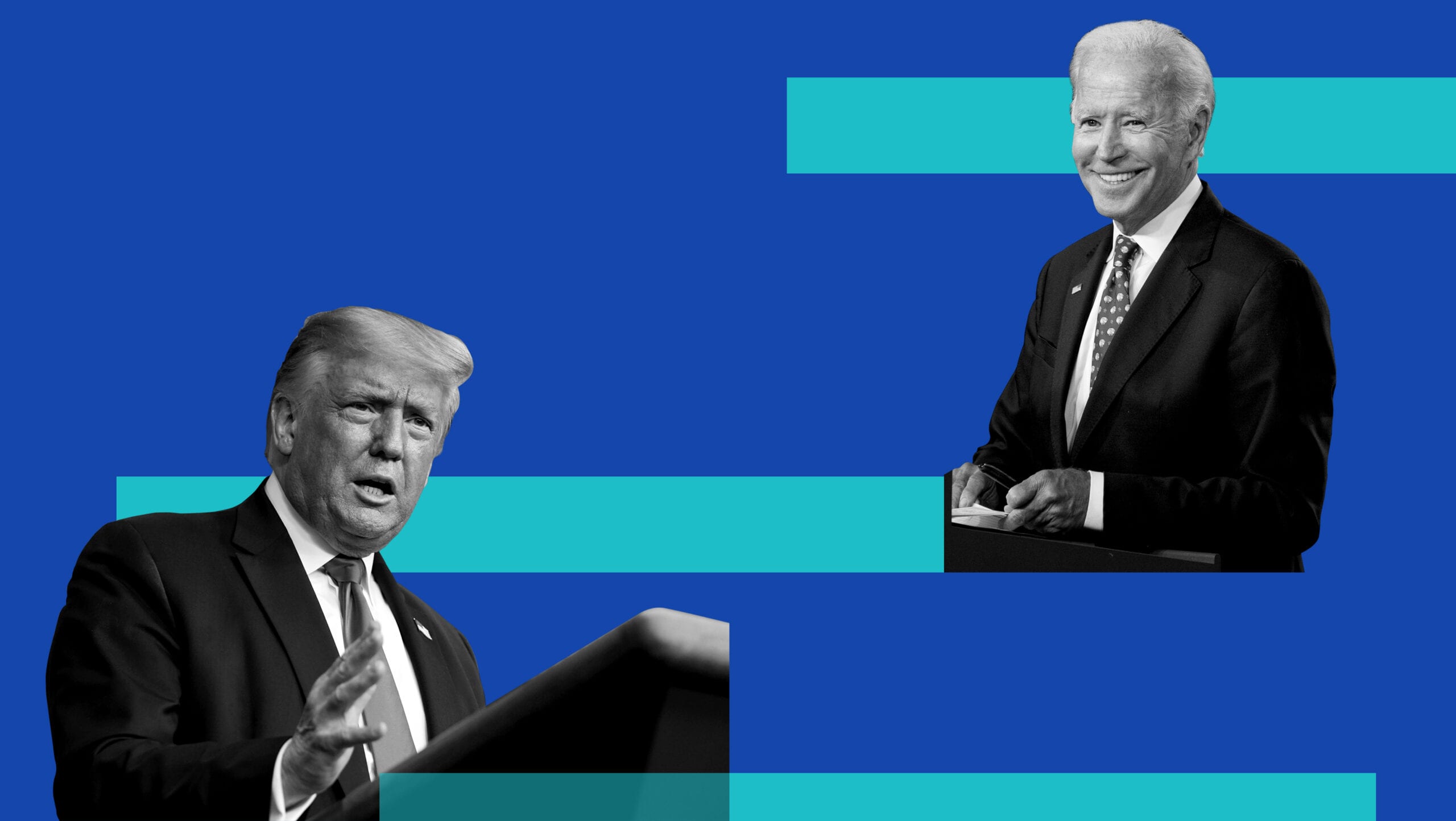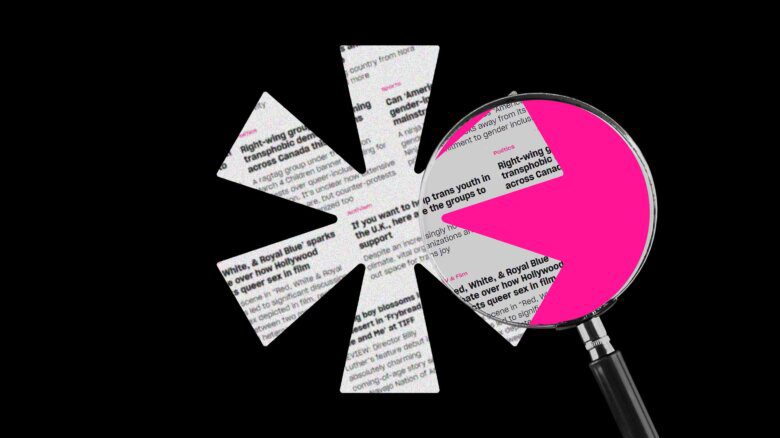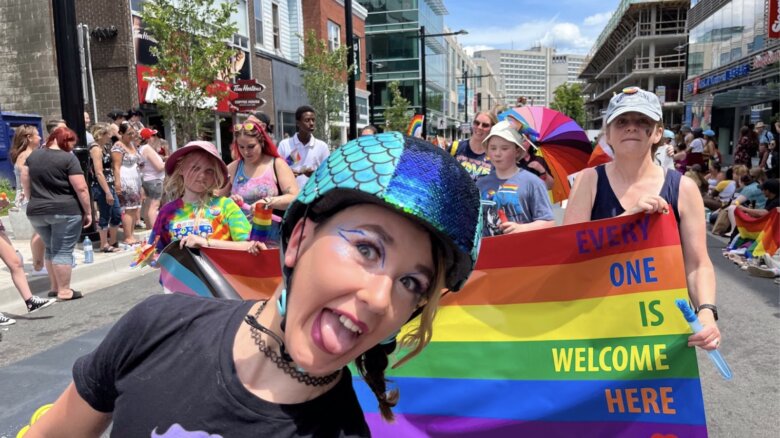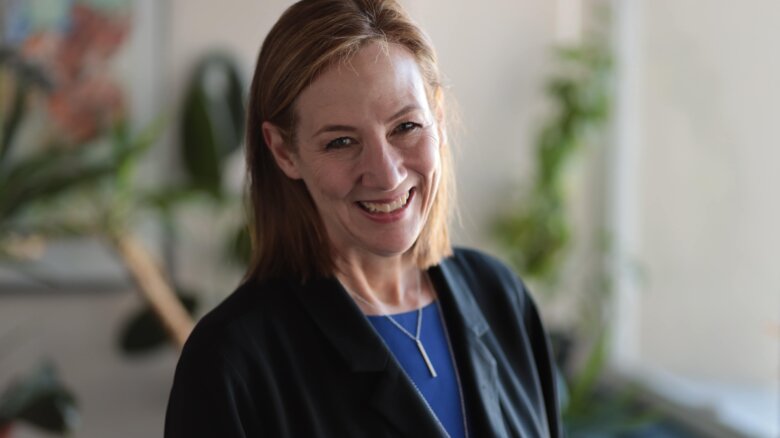Nearly four years ago, voters across the United States hedged their bets on a New York billionaire businessman-cum-TV personality for president. The damage of a Donald Trump presidency came swiftly. A burgeoning far-right movement, emboldened by “Make America great again” rhetoric and red hats to match, pushed marginalized communities aside. Trump rallied on hate: to build a wall and keep out the Other; to limit the rights of trans Americans; to erase mention of LGBTQ2 people in the country. Under Trump, the U.S. has become an increasingly unsafe space for our communities.
That’s what makes this November’s election especially important: It’s among the greatest of opportunities to make the country a better place. That’s been evermore clear as presidential campaigns have worn on over the months. For the first time in American history, Pete Buttigieg, a gay man, was a viable candidate to run for the presidency. Democratic Party leader Joe Biden is credited with convincing Barack Obama to back gay marriage during his time in office. And Tammy Baldwin, an out lesbian, is in the running as Biden’s vice-presidential candidate pick. All this on the heels of a massive human rights victory at the Supreme Court of the United States, enshrining anti-discrimination employment rights on the basis of sexual orientation and gender identity.
As Americans head to the polls this fall, Xtra will be keeping a close watch on all things LGBTQ2. Last year, we provided extensive coverage of the Canadian election—and we aim to do the same during this pivotal moment in American history.
That’s why, in addition to regular coverage of LGBTQ2 issues in the U.S. election on our website, we’re reviving our Rainbow Votes election newsletter. This time, Xtra contributor Nico Lang, based out of L.A., is at the helm. (You may know him from The Advocate, Into, Them. and Vice.) Consider him your heavyweight political reporter with the intel on everything you need to know about queer and trans issues and policies ahead of the November vote. Lang has been covering U.S. politics for nearly a decade and will bring his expertise to your inbox every other Tuesday, beginning August 11.
I sat down with Lang to chat about the election, the forthcoming newsletter and what gets him excited about U.S. politics.
It’s been a whirlwind four years. How are you feeling about the election ahead of us?
As a pessimistic person by nature—my husband believes my pop culture doppelganger is Daria—I am uncharacteristically optimistic about the U.S. election. We’ll get to the grandstanding about the future of democracy being at stake later, and for now, let’s just focus on the data: Trump is trailing in the polls, badly, in a way that breaks markedly from his upset victory in 2016. If you look at the polls leading up to the previous election, Hillary Clinton’s lead fluctuated wildly, like a driver who had one too many cocktails. And if you factor Green Party candidate Jill Stein and perennial Libertarian nominee Gary Johnson into the mix, her margins were never all that convincing. The 2016 race was always tight, but most Americans didn’t want to believe the country was capable of electing a persimmon-hued megalomaniac with tumbleweed hair who openly lusts after his daughter and sympathizes with fascists. The scales have fallen, so to speak, and now they can’t get up.
“I maintain a stubborn—but not unfounded—faith Trump will be repaid in kind this November”
This time around we are under no illusions that an American president can float postponing the election, claim he was merely joking and still keep 40 percent of the public’s unwavering support. And yet, the electoral outlook is entirely different from four years ago. Biden’s lead is not only large but it is what Clinton’s was not: consistent. Biden has led by at least eight points in national poll averages for more than a month, and Trump has never polled within four points of him at any point in the 2020 cycle. The president’s supporters maintain there is a secret Trump vote concealed behind the curtain like the Great and Powerful Oz, but that’s unlikely, given that racists and fascists have spent the past four years reintroducing themselves to the American public ad nauseam. Trump voters may have been shy in 2016, but if the average MAGA rally is any indication, they seem to have overcome such jitters.
People say the polls were wrong in 2016 and that they will be again. I am not convinced by this. It is just as possible that we have spent four years overcorrecting for the previous election by overestimating a man who has no great insight into the American voter and does not possess some intangible magic that allows him to defy the laws of political gravity. Trump is a fool whose solipsistic intransigence has led to the deaths of 150,000 people and who inherited a growing economy just to deliver the worst economic quarter on record. I maintain a stubborn—but not unfounded—faith he will be repaid in kind this November.
What’s the big issue this election that has you captivated?
Here’s the thing: I spend nearly every waking hour of my day researching and reporting LGBTQ2 issues, I don’t often have a great deal of time left to hear about things which happen outside my personal media bubble. So, the subject of LGBTQ2 rights occupies so much space in my brain that there’s little left for anything else. I know it is intellectually incurious to be so single-mindedly a one-issue voter, but when two dozen transgender people stop being murdered in the U.S. every year, I will have space for other things.
If I were to select one issue under the LGBTQ2 umbrella, I believe that the spate of homicides affecting the trans community is among the great moral failings of our time. American society has starved our most marginalized of resources and then ignored their deaths almost entirely when the lack of options they are born into leads to a cycle of inescapable violence. Some days this reality slices through my every waking thought. While my friends are having Zoom hangouts with each other, I’m searching Facebook through profiles of 38-year-old bald men who could potentially match the description of a homicide suspect.
But to pick something aside from LGBTQ2 issues, we have essentially been given 10 years to devise a global answer to climate change to avoid mass extinction and yet have wasted the past four years on a president who pulled out the Paris Agreement to score points with people who think Jesus had a pet dinosaur. Avoiding the imminent destruction of our planet isn’t just an issue. In some ways, it’s the only issue.
What do you think is being overlooked right now? What should we be giving more attention to?
Something that concerns me as we potentially move toward a new administration is how we build sustainable progress that won’t immediately be jeopardized should the country wake up in 2024 and decide to feel a quaint nostalgia for 1933 all over again. It is not enough for people who believe in equality to win elections and emerge triumphant in historic Supreme Court rulings; those victories must be safeguarded and protected so they may be enjoyed for decades and generations to come.
“We must stay focused on making sure we do not immediately begin moving backward in January 2021”
This is why we as a culture must move away from a backlash politic that is pervasive in our dominant thinking. The two major parties have spent the past five elections ping-ponging back and forth: Bush, Clinton, Bush, Obama, Trump. A Democratic presidency will be followed by a Republican administration that reins in the so-called liberal excesses of the past eight years— which is really just conservative lobbyist jargon for basic human rights—and this vicious cycle leads to a kind of mutually assured destruction. Instead of building long-lasting solutions to the most pressing problems facing our global society, we are repeatedly forced to start back at square one. Should Biden take office in January 2021, he will spend the greater part of his first (and possibly only) term rebuilding a federal bureaucracy that was gutted like a poorly maintained split-level home on the HGTV network—whether it’s restaffing the Presidential Advisory Council on HIV/AIDS, refunding programs like President’s Emergency Plan For AIDS Relief or making sure America has a working post office.
While people view the 2020 election as the answer to our social ills, we must stay focused on making sure we do not immediately begin moving backward in January 2021. Public opinion has a way of shifting away from the Commander-in-Chief—such as the increasing support for Black Lives Matter under Trump—and that could be incredibly harmful for LGBTQ2 people and other marginalized groups in 2024. Conservatives have already begun to lay the groundwork for that pendulum swing. A recent survey by Media Matters showed, for instance, that right-wing websites like LifeSiteNews and The Daily Caller drive more Facebook traffic to articles on LGBTQ2 issues than any queer publication currently in existence. That means these outlets have the power not only to define our narratives but to use our stories as wedge issues to win future elections. These phenomena should not be ignored. Conservatives are highly motivated, organized and resilient, and should they be defeated in three months’ time, they will immediately double down on exploiting every community they can in a kamikaze bid to regain power—and keep it.
If you take nothing else from this diatribe, my dear reader, think about it this way: Trump may very well be defeated in 2020, but if the cult of personality surrounding Sarah Palin opened up the door for him, who does Trump open the door for?
You’ve covered U.S. politics for a decade. What’s the most memorable story you’ve worked on?
This is a difficult and extremely loaded question, and I don’t want to be ungenerous toward the many people who have shared their lives with me over the past 10 years. I went to cover a fake gay bar in North Dakota and slept in the guest room of an extremely kind stranger who showed me the joy and wonder of fried pickles and lavash. I travelled to Mississippi after the passage of its religious freedom law and lived out the plot of a Stephen Chbosky novel by going to a college prom with the world’s coolest group of Southern queer students. I sang “Believe” at a dry karaoke bar—which served cocktails consisting of various sugary beverages mixed together—while covering an LGBTQ+ Pride festival in Provo, Utah, and there I learned that Mormons love Cher. I have become acquainted with the most incredible young transgender student activists fighting their own school administrations to go to the bathroom; interviewed mayors, governors and presidential candidates; and was accidentally filmed doing a Tom Cruise run in my street clothes by a local news station in New York because I was standing in the wrong spot for a press gaggle with former Democratic hopeful Beto O’Rourke. All of these outlandish and intensely wonderful things happened in an industry that is continually making less and less space for LGBTQ2 journalists and LGBTQ2 stories, and I feel profoundly lucky to have gotten to live the life I have.
“I believe it is more critical than ever to tell the stories of the LGBTQ2 community in our own voices and to educate both ourselves and those around us about the issues that affect us”
That said, one story sticks out to me as being particularly special. My writing partner, Kate Sosin, and I travelled to Anchorage in March 2018 to cover a vote that would determine whether a city ordinance protecting transgender people in housing, employment and public accommodations would remain in place. The first person we met was an Uber driver who told us he felt that local voters would absolutely repeal the law, which he claimed inspires rapists to assault young women in public restrooms. (Hint: It does not.) As reporters, we had the rare chance to affect and shape that discussion, to demystify false notions of who trans people are and debunk the lies that allow others to dehumanize them. We wrote a dozen stories during our time there, and our coverage—among other matters—revealed fraudulent practices by which conservatives got the issue on the ballot and exposed a misleading commercial in which an anti-trans activist was brought in from out of state and passed off as a concerned local mother. Anchorage citizens ultimately elected to keep the ordinance, the first time in our nation’s history that trans rights were upheld at the ballot box. That victory was chiefly the result of a dedicated campaign waged by local activists, but it felt good to contribute in some way.
What should our readers expect from Rainbow Votes 2020?
I don’t like to promise things because, having covered politics for most of my adult life, I know that promises rarely pan out as one would hope. (How’s that wall coming, Mr. Trump?) That said, I believe it is more critical than ever to tell the stories of the LGBTQ2 community in our own voices and to educate both ourselves and those around us about the issues that affect us. I hope that readers will learn something about the world around them. I hope that they will leave every newsletter a little more informed, but also inspired by the work being done by incredible people coming together to make an impact on their communities. But more than anything, I hope this project forces us to ask what we can do to be a part of that greater movement for change while we still can.
Every time the American presidential election rolls around, there is a refrain that this one is the most important of our lifetime. In 2004, The Atlantic said the race between George W. Bush and John Kerry “may be the most important in generations.” Obama invoked the sentiment himself while campaigning in 2008, and there that most well-worn of political axioms was again in 2012 and 2016. That may have been true in each of those cases—and I’m certain it was—but the difference in 2020 is that unless each of us joins the fight, the U.S. may not have another presidential election.

For more U.S. politics delivered straight to your inbox, subscribe to Rainbow Votes 2020 today! Enter your email address below:
You can unsubscribe at any time by clicking the link in the footer of our newsletters. Our emails may contain promotional messages, please see our Privacy Policy.


 Why you can trust Xtra
Why you can trust Xtra


